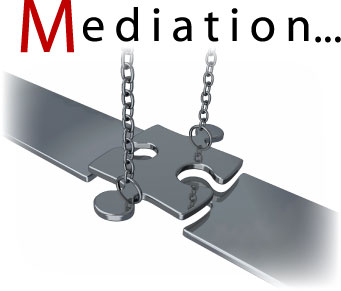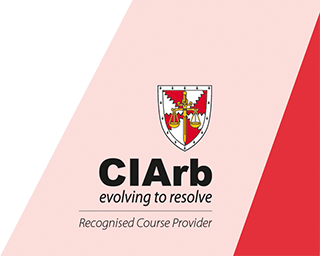Frequently Asked Questions
-
The recognised and approved full 5 day mediation course will qualify you to be an Accredited Mediator.
You will then be able to join the Civil Mediation Council (CMC) and to apply to be a Certified Mediator with International Mediation Institute (IMI).
In addition if you pass the course you will automatically be eligible to join the Chartered Institute of Arbitrators (CIArb) as an Associate member.
To pass the course you will need to:
- Attend every session (40 hours)
- Be assessed as safe and competent during your assessed role play
- Pass the written examination.
Professional practice
Internationally you will then satisfy many jurisdictions' requirements.
In England and Wales, if you wish to become a member of the CMC, you will need to comply with their membership requirements. The current guidance is available on the CMC website.
.jpg)
-
The independent delegate feedback is remarkable and consistently achieves 5-star reviews.
Some unsolicited quotes from emails received recently include:
"The best course I have done in 35 years as a Consultant. Fantastic resources, trainers and materials."
"The course was excellent, well planned and delivered. I couldn't recommend it more highly."
"I just wanted to say thank you for such a great course last week. I was really apprehensive beforehand – the last time I had done an exam was in 1987! I am also not that comfortable with role plays – I get very self conscious. However, I enjoyed the whole thing so much. I thought the content was great, really liked the delivery style and now I realise why the role plays are so useful."
"You were great to learn from, kept us interested and reassured us we could do it, but made it challenging at the same time."
'Probably the best course I have ever done - and I have done plenty!"
"Thank you for a wonderful week of instruction and interaction. I thoroughly enjoyed it."
"Just a quick email to say thank you very much for a really great course - I enjoyed it and also found it challenging: ideal!"
-
Assessment and Examination Appeals Policy and Procedure
1. Policy
1.1 Right to Appeal
1.2 The appeals process is available to delegates on courses run by the London School of Mediation.
2. Procedure
2.1 Delegates have the right to appeal to the London School of Mediation Assessment and Examination Appeals Committee for a review of a final decision of the London School of Mediation Assessor decisions on assessment, and examination and course Certification.
2.2 This applies to the following decisions:
(a) Appeal against the failure to achieve a safe and competent grade in the Assessment phase;
(b) Appeal against the failure to achieve the minimum pass mark in the written Examination;
(c) Appeal against the mark awarded in the Examination;
(d) Appeal against the failure to be awarded a certificate of satisfactory completion of the course.2.3 This includes appeals against a requirement to take reassessments.
2.4 An appeal may only be submitted in relation to the final decision of the Assessors and/or the Examiner.
2.5 Appeals will only be considered if submitted within one calendar month of the delegate receiving notification of the decision they wish to appeal against.
2.6 Only written requests for Appeal presented clearly and comprehensibly will be accepted.
2.7 There may be times when a delegate submits an appeal, the subject of which is actually a complaint, or vice versa. In these cases, London School of Mediation may decide to reclassify the appeal or complaint, at whatever stage of the procedure that has been reached, and London School of Mediation will inform the delegate of this.
2.8 If it is clear the circumstances claimed by the delegate do not constitute sufficient grounds for an appeal, the case will be rejected immediately. This includes instances where:
(a) the delegate has provided no substantial, relevant evidence of a procedural irregularity or of prejudice.
(b) the procedural irregularity claimed by the delegate clearly could not have affected the decision against which the Appeal is being made to an extent that would have led to a different decision.
(c) no substantive reasons have been provided for regarding the decision as manifestly unreasonable2.9 Where it is believed that there may be grounds to Appeal, an investigation will be conducted.
2.10 Once a member of the Board of London School of Mediation has been personally involved in the delegate’s case whether at any stage of the Appeal process or in circumstances relating to the subject of the Appeal, they will take no further part in the Appeal process.
2.11 If the Board member of London School of Mediation believes that the case is insufficient and therefore bound to fail, the appeal will be rejected.
2.12 Where a case is rejected, the reasons for the decision will be conveyed by letter to the delegate. This will not prevent the delegate from submitting a revised case within one calendar month of receiving notification of the outcome of their Appeal if the delegate has new evidence to make known.
3. Grounds for Appeals
3.1 It is for the delegate to establish their case and only claims of one of the following circumstances will be considered as grounds for appeal:
(a) That parts of the documented assessment procedure were not applied and that this procedural irregularity which has disadvantaged the delegate was significant enough to have materially affected the decision/recommendation made, rendering it unsound.
(b) That the decision-making body took a decision which no reasonable person would find comprehensible. Disagreement with the decision does not make it manifestly unreasonable. To apply this ground you must provide substantive argumentation as to why no reasonable person could have arrived at the decision that was made.
(c) That prejudice or bias on the part of one or more of the Assessors or Examiner took place and can be proven (evidence must accompany the submission).3.2 The following circumstances will not be considered grounds for appeal:
(a) Perceived past shortcomings in tuition, supervision or support not previously raised with London School of Mediation cannot be considered as grounds for appeal. Concerns relating to the quality of teaching or supervision, or other circumstances that relate to the delivery of a course before the commencement of assessment or the submission of the written Examination should be raised under the Complaints Policy as they arise.
(b) An Appeal may not be made to question the academic judgement of the London School of Mediation Examination Moderators, and the delegate will not be permitted to argue the academic merits of his/her work. The delegate's feeling that the result unfairly reflects the merit of their work or their ability is not a ground of appeal.
(c) An Appeal may not be made against the actual mark awarded for the assessment, which is a matter of academic judgement, except where the case rests on a claim of procedural irregularity. If a delegate wishes to have clarification about a mark received for an individual assessment they are advised to raise this at the time with the Assessor or Examiner at the time that debrief is provided.
(d) A delegate who has submitted an extenuating circumstances claim to the London School of Mediation and is dissatisfied with the outcome should use the Complaints Procedure.4. Oversight of the Process
4.1 The procedure is managed by the Directors of London School of Mediation.
5. Further Steps
5.1 There is no right to Appeal the decision of the Appeal Process.
Last amended 18 October 2021
-
The course broadly takes the form set out below and is a demanding, challenging, and rigorous week which includes after hours homework. The course provides the most extraordinary professional experience and learning, that universally receives the highest accolades. There is a mix of teaching and role plays that have been developed over almost two decades to provide a near-perfect blend that is constantly adjusted to meet the needs of delegates.
Day One
- Introductions
- Mediation theory
- Negotiation
- Mediation skills
- Demonstration
- First Role-Plays
Days Two & Three
- Equal mix of tuition and role-plays with a strong emphasis on mediation ethics and mediation skills
Days Four & Five
Assessment Days based on:
- Practical assessment as a mediator
- Analysis as an observer and/or role player
- Assessments are independently conducted to published assessment criteria
Written work
- Open book examination
- Self assessment critique
What do I need to attend?
There is no age limit high or low. There is no need to be a lawyer, to have a degree, or to be a judge. The course is skill based and builds on all the experience of the varied participants. You should have an interest in people and in assisting individuals, groups, and organisations find solutions for disputes which may appear intractable.
You will need a real readiness to listen, to think and to have a willingness to learn new skills.
Delegates need a good grasp of technical English.
There is a significant amount of pre-reading and reading on each of the course days.
Assessment is to the standard required for UK professional practice.
What will you learn?
Our faculty will give you remarkable training and the skills you need to:-
- Learn how to manage the mediation process effectively
- Transform the way you and others communicate verbally and non-verbally
- Learn how to settle disputes and conflicts effectively
- Develop and refine questioning techniques
- Learn how to get beyond intractability
- Develop and refine negotiation skills
- Understand more about non-verbal communication
- Encourage participants through neutral language towards settlement options
- How to develop a mediation practice (guidance is provided for beyond the course).
-
Approached with energy, enthusiasm and skill there is good earning potential
Without a marketing strategy, however, you are unlikely to get your mediation practice off the ground. There are many options for beginning a practice; joining a panel; creating your own panel; offering some pro-bono mediation; setting up independently; and in house mediation services to name a few.
The 9th CEDR Audit of Mediators 2021 offers some guidance on earning potential. Novice mediators earn an average of £1,480.00 per day, whilst experienced mediators earn an average of £4,273.00 per day. We will help you get started by providing you with a "Next Steps" document containing general marketing advice and guidance.
Many of our delegates have gone on to use their mediation skills in different ways offering wide range of services. There are new and emerging areas for mediators to practice in and in some sectors, mediation is mandatory or likely to become mandatory in the near future. There is then a growing need for well-trained facilitative mediators.
Call us to discuss - +44 (0) 207 583 0444.
-
The London School of Mediation is a Civil Mediation Council (CMC) Registered provider of mediation training. We are a Chartered Institute of Arbitrators (CIArb) Recognised Course Provider and we are an International Mediation Institute (IMI) approved Certified Mediation Training Provider.
We are determined that increasingly high standards should be applied to training and that the LSM course will always greatly exceed that which is the recognised minimum.
LSM's course is taught by experts in the field. All are practicing mediators, who bring their mediation casebook to their teaching so that delegates can learn from their extensive experience.
-
As a mediator, you are not being retained to provide any legal advice.
A law degree or other legal qualification is not a requirement.
It is worth knowing that while many lawyers make excellent mediators, some of the best mediators are non lawyers. The 9th CEDR Mediation Audit highlights that 56% of mediators who responded to the audit were non lawyer mediators.
Our delegates come from a very wide range of diverse backgrounds, including counselling, medicine, engineering, HR, Ombudspersons, head teachers as well as lawyers and judges.

-
No! Some of the best mediators come from a wide variety of professions or diverse sections of the community. You need only to be able to listen, to ask perceptive questions, to have enthusiasm and interest, and to want to help others without judging or advising. Lawyers can make strong mediators but many of our delegates are not legally trained.
-
Our course does not accredit delegates to conduct family mediations. Whilst the skills may be transferable, the process is very different and requires an alternative training path.
We certainly touch on family relationships, inheritance and trust matters, as well as a range of family issues within our roleplays. This does not however qualify delegates to conduct family mediations or deal with matters relating to the Children Act 2004 or the Family Law Act 1996.
Please contact the Family Mediation Council should this be an area you are interested in.
-
We keep course costs low as we do not carry significant overheads. Our courses are very competitively priced but still maintain a high tutor/delegate ratio.
Delegates may take advantage of our early bird booking discount or Flash Sale prices when available.
We offer discounts for multiple or group bookings. Please email us at: michelle@londonschoolofmediation.com
-
To have registered on a course, you will have been asked to accept our Terms and Conditions.
Once you have registered on a course you will receive an email confirming your booking.
You will (except in the case of a late booking) have a cooling off period of 14 days to cancel without loss.
If you cancel, amend or transfer after 14 days, a fee is charged. If you cancel with less than 30 days to go, then you will lose 50% of the fee, and if you cancel with less than 14 days to go, you will lose the whole of the fee unless you transfer to another course when an admin fee will apply.
Please see the Terms and Conditions page for more detail.
-
LSM has been approved as a Registered Training Provider by the Civil Mediation Council (CMC), approved as a Recognised Course Provider by the Chartered Institute of Arbitrators (CIArb) and approved by the International Mediation Institute (IMI) as a Certified Mediation Training Provider. These processes involve scrutiny of our course content, delivery and assessment. We adopt policies which are robust and contemporary and reflect our ethical standards and ethos.
These include policies or practices on:
* Staff and faculty selection and induction
* Course preparation and briefing
* Health and safety
* Mediation standards and ethics
* Diversity and equality
* Staff dignity
* Privacy
* Data protection
* Appeals
* Complaints
* Discrimination
* Special needs, adaptations, disability
* Complaints
These are all set out in our Tutor Handbook. Those policies pertinent to delegates are published on our website.
-
LSM welcomes feedback and we take this both formally and informally, as well as having our courses reviewed externally by the CIArb, CMC and IMI.
* The complaints policy can be accessed at the link at the foot of this page or by emailing michelle@londonschoolofmediation.com.
* The appeals policy can be accessed by emailing tessa@londonschoolofmediation.com.
-
POLICY STATEMENT
HOW WE PROTECT AND LOOK AFTER STAFF AND FACULTY MEMBERS
The Directors greatly value the contribution made by all members of the faculty and support staff to the delivery of a high quality education service for the benefit of the delegates. We recognise that the quality of this contribution will be influenced and enhanced if all members of staff and the faculty can enjoy a working environment which supports and encourages them in working to their full potential.
The Directors are committed to promoting and sustaining a working environment in which all members of staff feel valued and respected and in which they co-operate and communicate effectively with each other in seeking to achieve the highest standards of work performance. Any language or behaviour which has the effect of undermining, humiliating or threatening another person, including harassment and bullying, is unacceptable and will be neither permitted nor condoned. We believe that all members of staff, our directors, and faculty will actively support this commitment and will use language and behaviour that is consistent with our expectations. We also recognise, however, that we need to have clear arrangements in place for raising and addressing any instance of the use of language and behaviour that is incompatible with these expectations.
The Directors will demonstrate their commitment to a working environment and working relationships which are based on respect for and recognition of the individual contribution made by all members of staff and faculty by:
3.1 Clearly communicating the standards that all members of staff and faculty have the right to expect and are expected to demonstrate to others in all workplace communications
3.2 Equipping the directors, staff and faculty with the knowledge and skills required to influence a positive working environment and working relationships
3.3 Alerting all members of staff and faculty to the type of language and behaviour that is not acceptable and, where this occurs, how this will be dealt with
3.4 Identifying a range of sources of information and assistance for members of staff and faculty to help them decide what to do if they experience unacceptable language or behaviour
3.5 Establishing appropriate informal and formal arrangements for members of staff and faculty to raise instances of unacceptable language or behaviour.
3.6 Ensuring that complaints are handled sensitively and are fully investigated through appropriate procedures.
3.7 Monitoring the implementation of this policy and evaluating its effectiveness.
RESPONSIBILITIES
4.1 The Directors will implement this policy by:
* setting examples and standards of behaviour in the workplace and training environment
* recognising destructive behaviour and taking action where it occurs
* ensuring that staff and faculty know about this policy and how to raise bullying/harassment issues
* being clear about their role in dealing with complaints4.2 The Director ultimately responsible for this Policy and to whom any complaints about a breach of the Policy which are unresolved by managers or staff should be addressed is:
Tessa Herman
Director
London School of Mediation Limitedtessa@londonschoolofmediation.com
_____________________________
+44 (0) 207 583 0444 London
This policy will be reviewed on 1 January 2023

Can’t find the answer?
If you can't find the answer to your question, then please contact us.
About us
London School of Mediation is one of the world’s leading organisations for mediation training.
We are unique in the support we provide for alumni, on our courses and afterwards. We are passionate about mediation and its role in business, for the workplace, in civil, commercial and insurance disputes, medical matters, the community, consumer, contract, property, employment and human rights.

Testimonial
Probably one of the best (if not the best) course I have been on. Challenging, hard work but enjoyable. - Chris McCafferty

